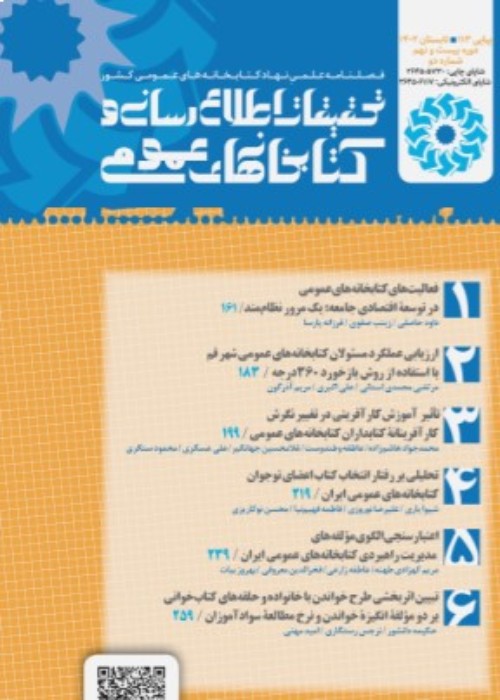What is information? with an Emphasis on Zins’s Views
The aim of this paper is to explore some important views and theories of information and knowledge in the area of library and information science (LIS) and then to propose a new model of information and knowledge.
This research has been conducted by using a comparative content analysis of the existing materials on conceptualizations and definitions of information and knowledge and delving into them.
In the present paper, the author considers different ideas about the information and then proposes a new model. According to this new model, information is the human’s intentional attention to the relationship between the components of a phenomenon (i.e. entity) or process, or between a phenomenon/process and other phenomena/processes in the world. According to this view, all phenomena and processes exist ontologically. Our attention to them is existent too, but they are different from their physical existence. Furthermore, according to this model, information is based on the external reality which is outside our minds. They are not our information because we have not made them. They are God’s knowledge and information. When they are in the presence of us, directly or indirectly, they are our information. In this case, we may acquire knowledge of the relationships between their components. This is our real information of which our minds take pictures immediately in order to be used in the absence of phenomena. This second position is mental perception which is based on the first one, not vice versa. From this time, when we want to use information or transmit it to others, we have to make signs and symbols of them which comprise tokens, words, sentences or pictures. From here, the domain of epistemology begins, which though based on the reality may be influenced by our mental, historical and cultural conceptions. Thus our given names or comments may differ from one another. These differences cannot affect and question the very realities. If we accept this model, there is no need to omit nonphysical phenomena from the information definition. Metaphysics is the other side of physics, except God who is the creator of both physics and metaphysics. In other words, the world consists of physics and metaphysics, or known and unknown. As science and experience grows, many unknowns become known. Moreover, our knowledge of things in itself is metaphysical. In addition, when we make a whole by observing similar individual phenomena, and then abstract a universal (i.e. a characteristic or property that particular things have in common) from that whole, this universal is somehow metaphysical. Meaning is nonphysical or metaphysics too. Although this model originates from human, it has not originated from his mind. Knowing the outer reality is an indication of our soulchr('39')s ability to create information. Man knows a phenomenon, but psychological matters are not involved in the knowledge and perception of the very phenomenon. Furthermore, in ontological terms, this model is not based on propositions, but it is for the transmission of information to others that one has to make propositions. Here, our propositions do not affect the real facts, but only show our perceptions and interpretations.
Originality/value:
Such analysis has not been conducted thus far, and thus if it is fully considered, it can change our views about the phenomena and the creation of the world, mind and matter, both ontologically and epistemologically.
- حق عضویت دریافتی صرف حمایت از نشریات عضو و نگهداری، تکمیل و توسعه مگیران میشود.
- پرداخت حق اشتراک و دانلود مقالات اجازه بازنشر آن در سایر رسانههای چاپی و دیجیتال را به کاربر نمیدهد.



